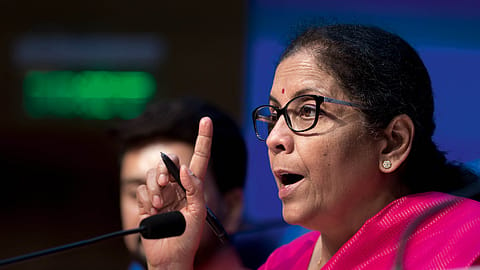FM announces ₹102 lakh-crore national infra plan
It is in line with PM Narendra Modi’s promise of investing ₹100 lakh crore in infra projects to achieve the goal of India becoming a $5-trillion economy by 2024-25.

Union finance minister (FM) Nirmala Sitharaman on Tuesday announced a ₹102 lakh-crore national infrastructure pipeline (NIP) package in line with the Narendra Modi government’s vision to make India a $5-trillion economy by 2024-25.
The finance ministry had set up a task force headed by the economic affairs secretary to prepare a road map for the NIP from 2019-20 to 2024-25 under the ₹100-lakh-crore infrastructure plan.
“Today, the task force has identified Rs 102 lakh crore worth of projects after conducting 70 stakeholder consultations in four months,” Sitharaman said at a press conference in New Delhi.
Under NIP, ₹2.5 lakh crore has been allocated for port and airport projects; ₹3.2 lakh crore for digital infra projects; ₹16 lakh crore for irrigation, rural, agri and food processing projects; and over ₹16 lakh crore for infra projects, including mobility projects. The Centre and states have spent ₹51 lakh crore in the past six years.
The Centre and states will finance 39% each in the Rs 102-lakh crore infra projects and the rest 22% will be funded by the private sector under the new public-private-participation model. Sitharaman was optimistic that the share of the private sector would go up to 30% by 2024-25.
That’s not all. To ensure that these projects are completed in time and monitored on a regular basis, the government has also set up a National Infrastructure Pipeline Coordination mechanism. It will comprise representatives from the Centre, states, and the private sector for detailed planning, information dissemination, and implementation of the NIP framework.
The projects identified are in sectors such as power, railways, urban irrigation, mobility, education, and health, Sitharaman said.
Recommended Stories
Giving a status report of the projects under NIP, she said that 43% were under implementation, 33% at the conceptual stage, and 19% under development. And in the next couple of weeks, another ₹3 lakh crore worth of projects will be added, taking the total to ₹105 lakh crore.
The finance minister further said the infrastructure pipeline will enable more infrastructure projects, create jobs, grow businesses, improve ease of living, and provide equitable access to infrastructure for all.